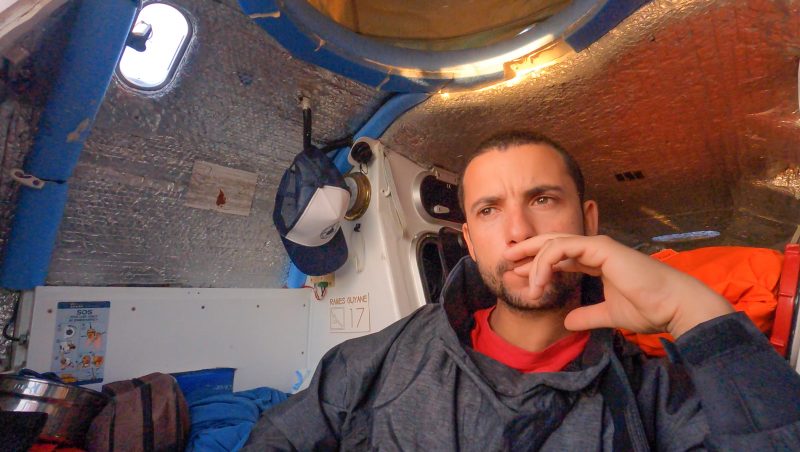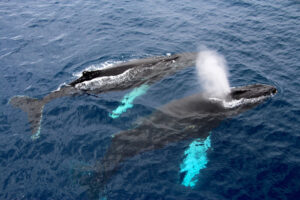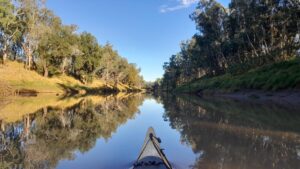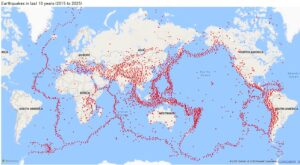Since our last roundup of ocean rowing expeditions, some crews have ended their new routes and storms in the Atlantic and Pacific have ramped up.
Pacific Ocean
Erden Eruç (Turkey)
On June 22, Eruç set off in his boat Around-n-over from California bound for Hong Kong. He has been rowing for 71 days and covered 3,000km.
He faced multiple storms in August. The month started with Tropical Storm Hilda, which brought northwesterly winds and swells. The remnants of Tropical Storm Jimena quickly followed. Then came Kevin, then Linda, which became a hurricane.
For safety, he moved out of its path and off-track. He often had to use his para-anchor. Since the storms have died down, the currents and winds have been “messing up my plans big time,” he said.
Eruç had hoped to row nonstop to Hong Kong but the weather and the logistics of entering China have forced him to reassess. In March, he was denied an entry visa because of the pandemic. Embassy officials told him to reapply when the San Francisco office reopened. It is still closed.
“An earlier launch with a month or two of pause at Waikiki to relaunch in September would have been wiser and less risky overall,” he wrote in hindsight.
North Atlantic, U.S. to Europe
Guirec Soudée (France)
Storms at the end of June led to the loss of Soudée’s communication devices, but the Frenchman was determined to carry on. He has continued to update his position by asking the larger ships that he passes to relay his coordinates.
He began in Massachusetts and has now been at sea for 78 days. His destination: Brest, France. On August 18, his message home said, “I am safe and going to France. My plan is to arrive in France the first week of September.”
Unfortunately, easterly winds picked up and pushed him backward for several days, throwing off his schedule.
On August 25, a passing ship informed him that the winds were not going to die down for at least another week. He is now unable to row because of the weather. Soudée is holding to and waiting for it to pass. He has sufficient food for 23 more days at sea.
Ocean Revival (UK)
On August 11, Ian Clinton, Simon Chalk, Jordan Swift, and Matt Mason became the first-ever crew to row from New York to London. It took the foursome 72 days to cover the 5,572km route. They arrived at Tower Bridge in London to cheering crowds.
Once back on dry land, Jordan Swift told CNBC that the physical aspect of that challenge hadn’t been as hard as anticipated. The biggest difficulty was the emotional ups and downs from all the weather setbacks.

Photo: @Oceanrevival2020
Ian Rivers (UK)
The ex-Special Forces soldier has become the first person to complete an unsupported solo row from New York to the Isle of Scilly, UK. It took 83 days and 21 hours. Interestingly, he chose to navigate with a sextant rather than a GPS.
The final weeks of his row began with a vicious storm. The Force 10 storm hit him hard and he found himself in pitch black, upside down, and up to his neck in a flooded cabin. The capsize destroyed his maps and books, and he lost his AIS. Despite a few broken ribs, he decided to continue rowing. The only silver lining was that while checking the damage, he found a forgotten food stash.
Since capsizing, storms have continued to plague him. One broke his rudder. He managed to jury-rig a new one from spare parts. On August 24, he triumphantly made it to the Isle of Scilly.
Mark Delstanche (UK)
Delstanche is trying to be the first person to row solo across the Atlantic from New York to London.
He has been out for 79 days and has completed 94 percent of the journey. Currently, he is at a standstill on the Cornish coast. He needs the easterly winds to die down so that he can continue. Though he cannot leave the boat or receive assistance, many in the harbor have been coming out to chat with him. One visitor was fellow U.S.-to-UK rower Ian Rivers. Having finished his own journey, Rivers borrowed a canoe and paddled out to meet Delstanche.
Like Rivers, Delstanche has faced brutal weather over the last few weeks. At the start of August, he endured three storms in five days. The weather damaged most of his electronic equipment, including his tracker, and he was unable to row. Since then he has capsized three times, and on August 14 he faced four-metre swells. Fighting the swells, he clocked his top speed so far, 17.1 knots down the face of a large wave. It was “a bit hairy,” he said.
From August 20 to August 21, he rowed for 27 hours in a 31-hour stretch, hoping to get past the brewing bad weather. At that point, he had to pause in St Mawes. He has been there since August 24, waiting out winds that are predicted to last until September 8. “Now for the real endurance test, days at anchor not 50m from a pub, with many offers to bring me over a pint which I’m kindly refusing!” he said on social media.

Ian Rivers paddles over to chat with Mark Delstanche, who is stuck in St. Mawes. Photo: @Rowsentinel
David ‘Dinger’ Bell (UK)
Bell has been at sea for 93 days and has covered 82 percent of the distance from New York to Falmouth, UK. As with Rivers and Delstanche, he has found himself embroiled in storms and bad weather.
At the beginning of August, storms forced him to deploy his para-anchor. While anchored, he heard about the terrifying situation Rivers had found himself in. Rivers and Bell quarantined together before they started their respective rows and have stayed in contact as they crossed the Atlantic.
Bell’s family reported, “Dinger has gone from quite enjoying himself to being very worried for Ian. But also suddenly becoming very aware of the fragility of his own crossing.”
Physically and mentally, it has been a challenging few weeks. One morning, he woke to find he had drifted 15km in the opposite direction. The weather has consistently pushed him off course. “Not being able to make the desired progress is hard. Not being able to make it time after time after time is brutal,” he wrote.
On August 30, he was once again on para-anchor. Fortunately, weather reports show that the low-pressure system keeping him at a standstill is going to dissipate, and the weather might even turn in his favor. His team is hopeful that he could arrive in the next few weeks.

David Bell with some friendly dolphins. Photo: @NY2UKSoloRow
The Hard Way Home (IE/U.S.)
Réamonn Byrne (IE), Chris McCaffrey (U.S.), and Ryen Cosgro (U.S.) started their row from Cape Cod to Galway, Ireland on July 10. Problems plagued them from the beginning, and after seven weeks at sea, they had to abort.
During their first few days, they faced strong winds and almost immediately had to deploy their para-anchor to stop themselves from drifting back to the start line. Then they paddled through rainstorms, fog, and lightning. “We are caught in new tidal currents that make the oars mud half the time. Progress is slow. We accept it and push east,” they said at the time.
Fast forward to the end of July, and their watermaker had broken, electronics were shorting, and they were sitting in “gales, and mountains of swell.” In August, a wave ripped the rudder from the boat. They rebuilt the bracket and struggled on, only for their power system to break on August 27.
“We can’t go on with communications and safety systems dark, so while obviously disappointing, it’s a decision that makes itself,” they explained, before abandoning their quest.
Around mainland Britain

Ready, salt, row complete a round trip of mainland Britain. Photo: @Readysaltrow
Ready, salt, row
After 43 days, the six-man crew completed their row around mainland Britain on August 22. The round trip started and ended at Cowes on the Isle of Wight, an island off the south coast of England.
At the start of August, an illness forced them to stop in Aberdeen. After a few days, they were able to continue their row. As they made their way along the North East coast they met strong headwinds: “Mother Nature is really making us sing for our supper,” they wrote. Big winds hindered them during the last week of their row and forced them to spend a few days on para-anchor.
Though multiple crews have rowed the same route, they are the first mixed crew to do so. The men’s record around the UK mainland is 26 days, and the women’s record is 52 days.






